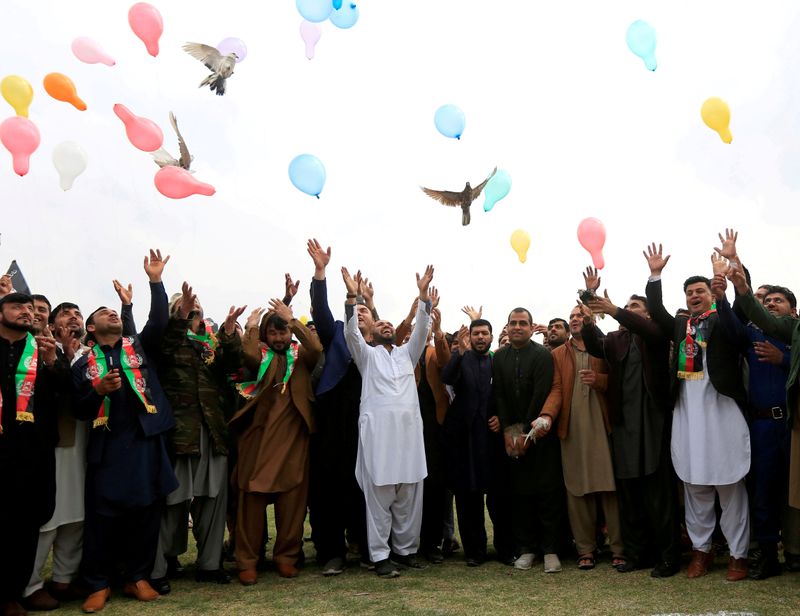By Idrees Ali and Rupam Jain
WASHINGTON/MUMBAI (Reuters) - U.S. troop strength in Afghanistan is down to nearly 8,600, well ahead of a schedule agreed with Taliban militants in late February, in part because of concerns about the spread of the coronavirus, U.S. and NATO officials said.
A key provision of the Feb. 29 agreement between the Taliban and the United States, to which the Afghan government was not a party, involved a U.S. commitment to reduce its military footprint in Afghanistan from about 13,000 to 8,600 by mid-July and, conditions permitting, to zero by May 2021.
Two senior sources in Kabul said the 8,600 target was likely to be achieved by early June.
Two U.S. officials, speaking on the condition of anonymity, said that the United States was close to 8,600 troops and could reach that number in coming days.
"Due to COVID-19 concerns, we are moving towards that planned drawdown faster than anticipated," one of the officials said.
The other U.S. official said the United States had focused on quickly removing non-essential personnel and those considered to be at high risk from the virus.
All four sources asked not to be identified due to the sensitivity of the matter.
U.S. forces are in Afghanistan to conduct counter-insurgency operations. A few thousand U.S. soldiers work with troops from 37 NATO partner countries to train, advise and assist Afghan forces.
NATO's mission in the country totalled 16,551 troops in February, according official data available on its website.
On Tuesday, U.S. President Donald Trump there were "7,000-some-odd" U.S. soldiers in Afghanistan but officials clarified that number was slightly over 8,600 troops.
Trump renewed his desire for a full military withdrawal from Afghanistan but added that he had not set a target date, amid speculation he might make ending America's longest war part of his re-election campaign.
NATO DILEMMA
The Taliban, who ruled Afghanistan with an iron fist from 1996 before being ousted by U.S.-led troops in 2001, have sought to topple the Western-backed government in Kabul and reimpose Islamic rule. They dismiss the Kabul government as a puppet of the United States.
The faster-than-expected withdrawal has put NATO in a dilemma as to whether it should consider swiftly sending back some non-U.S. troops from Afghanistan as well, two NATO sources said.
"The drawdown by the U.S. was expected to be done in 135 days but it's clear that they have almost completed the process in just about 90 days," said a senior Western official in Kabul on condition of anonymity.
The official said that some other NATO soldiers would be withdrawn before schedule.
"All allies have to maintain a fine balance on troop withdrawal as we cannot forget the fact that the war in Afghanistan is far from over," he said.
The Taliban have recently increased attacks in a number of provinces, despite the Afghan government releasing prisoners as per the U.S.-Taliban agreement signed in Doha.
According to data from Afghan and Western sources seen by Reuters, the Taliban have mounted more than 4,500 attacks since signing the deal.
In a statement, the Pentagon said it expected to be at 8,600 troops within 135 days of signing the agreement, but declined to say how many troops were currently in Afghanistan.
"We are not providing updates on current troop levels primarily due to operational security concerns associated with the drawdown," Pentagon spokesman Lieutenant Colonel Thomas Campbell said.

Officials are now looking at the pace of the drawdown beyond 8,600.
